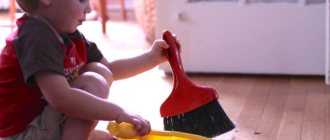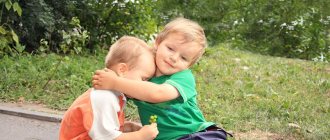Without exception, all parents must raise their children morally. This important criterion combines a complex of all the positive feelings and skills of any person. Those children who were raised in an atmosphere of morality easily go to the aid of another person, feel comfortable in a team, they persistently pursue their dream, turning it into a goal, while remaining honest. These children have self-confidence, they are brave and courageous, polite towards everyone around them without restrictions, and adequately perceive criticism.
Unintentional lies
- the child’s tendency to fantasize as an element of play, an extremely subjective depiction of events, a mixture of the real and the fictional;- easy self-hypnosis, readiness to see what is desired accomplished, what has been started completed.
- do not encourage or encourage the child to come up with new ideas, restore the truth, tactfully and carefully;- include the child in games and activities where his desire to demonstrate his strength, dexterity, ingenuity, etc. would find intensive use.
Moral education of preschool children
This article reveals the concept of moral education of preschool children. The directions and means of moral education are considered. Conclusions are drawn that moral education is a necessary condition for further personal development.
Key words: preschool age, moral education, directions and means of moral education.
Preschool age is a period when the active formation of moral qualities and attitudes, norms of morality and behavior occurs. Moral education plays an important role in the further development of the individual, as it influences mental, labor, physical and aesthetic development.
Morality implies concepts and judgments that reflect the essence of moral phenomena, enabling children to understand what is good and what is bad, what can be done and what cannot be done. The determining criterion for moral development is actions and actions that comply with the norms of morality and society.
The basis of moral education are universal human values, moral norms developed by people in the process of historical development of society. These include such personal qualities as honesty, justice, decency, respect, duty, humanism, and hard work.
With the development of society, new value orientations and principles, moral norms and behavioral habits appear. This is internationalism, respect for the state, authorities, state symbols, laws, patriotism, civic duty, self-demandingness, interest in events taking place in society, mercy.
A person's moral development continues throughout his life, but the foundations are laid in childhood. Children receive their first moral education skills in the family under the influence of life experience, ethical standards accepted in the family and feasible work. Therefore, when raising preschool children, it is necessary to pay primary attention to the formation of moral feelings and qualities. An important role is played by the emotional responsiveness of children, which is formed by the age of 5. At this stage of education, a feeling of love for family and friends develops. It is necessary to develop in children the skills of everyday communication, family work, and mutual assistance. This is how children recognize the authority of adults and fulfill their demands unquestioningly. On the basis of this, respect for elders and obedience are formed as behavioral traits.
To form a humane attitude in children towards their peers, the teacher must solve the problems of forming and developing friendly relations. It is necessary to develop in preschoolers such qualities as mutual understanding, respect for other people’s interests, willingness to help, etc.
To develop a feeling of love for nature, for the hometown, and in the future for the country, the teacher needs to create conditions that will evoke these feelings and experiences in the child. For example, holding ethical conversations, excursions, showing various works of art, holding events dedicated to the nature of the country's history.
The moral education of preschool children is carried out using many means, the most important of which are the following:
- Artistic media (literature, art, cinema, music, etc.) - influence the emotional sphere and feelings of children;
- Nature, as a means of evoking a humane attitude towards other people, feelings of compassion, empathy and care, influences the sphere of children’s personality in many ways and is one of the very means of moral education;
- Children’s own means of activity (play, learning, communication, work) contribute to the development of friendly relationships, hard work and cognitive interest;
- The environment, society (family, loved ones, friends, comrades, etc.) - influences the moral standards and value orientations of the child
The effectiveness of moral education depends on the correct choice of means, in accordance with the purpose and purpose of education, the age characteristics of children, and their level of development.
So, the moral education of children is one of the main tasks of society. A child lives in society and is influenced by both positive and negative environmental factors. In order to protect him from negative influences, it is necessary to lay in him the foundations of high morality, a culture of behavior and the basis of a respectful attitude towards the people around him. It is necessary to raise him into a person with strong convictions and life views. It is necessary to educate and shape the worldview of a growing child in the early stages of his development, when life experience is just beginning to accumulate.
Literature:
- Babansky Yu. K. Pedagogy: Textbook for universities. - M.: Education, 1983. - 248 p.
- Loginova V.I., Preschool pedagogy: A textbook for student teachers. institutes for special "Preschool pedagogy and psychology." - M.: Publishing house Enlightenment, 1983.
- Podlasy I. P. Pedagogy: New course: Proc. for higher education textbook institutions: B2 book. /AND. P. Podlasy - M.: Humanit. ed. VLADOS center, 2006. - book 1: General basics. Learning process. — 387 p.
What it is
How to choose the right position of moral education?
To do this, adults must know the definition of the concepts of morality, morality, and education .
Education refers to the assimilation of certain skills of social behavior instilled in the surrounding social environment, parents, and teachers.
A person uses these skills in social life. For example, he learns the rules of behavior at school, on vacation, etc.
Morality is the moral qualities of an individual , which set the boundaries of behavior, his spiritual qualities necessary for adaptation to the social environment.
That is, moral principles are the boundary that a person will never cross. Without these principles, humanity becomes like animals, guided only by instincts.
An individual may be well-mannered, know all the rules of etiquette, but his actions will be immoral, immoral.
Children's preschool group
A children's group is the second model of society after the family, in which a child learns to interact with other children and adults. Here moral rules are tested and sharpened. A child finds himself in a large number of situations and initially needs the constant presence of an adult.
No moral arguments will help if the baby is not supported, comforted and heard. Children need to be given the opportunity to complain and cry, and only after that make a moral analysis of their behavior.
Schoolchildren, teenagers and morality
Good manners is an important quality that is instilled in a child from an early age. School age is the most difficult in relation to the development of morality, since in the modern world there are a lot of temptations and cruelty. The fragile and sensitive psyche of a child can pass through a moral and ethical conflict with dignity only with good upbringing in the first years of life. Otherwise, school years can make children callous, indifferent and distant. Morality and ethics at this age should become subjects of discussion and regular analysis, but in order to participate in them, the student must have a base in the form of learned behavior and emotional maturity. A schoolchild who does not know how to put aside his desires, does not recognize the interests of others, with a low level of education, at this age will not be able to comprehend moral and ethical standards, since he does not need them.
Moral norms and ethical values are laid down only on the basis of respect for other people's views, the idea of the world as a place where millions of the same individuals live.
Moral education at this age is the development of the concepts of “society”, “Motherland”, “responsibility”, “duty”, “responsibilities”, etc. Schoolchildren, due to their increased emotionality, need vivid examples, stories and images that could attract them imagination. Over time, schoolchildren develop a critical attitude towards moral and ethical values, but this often arises not because of the desire to confront the norms, but to understand them from the opposite. The teenager criticizes moral values, trying to test their strength and needing the victory of an adult.
The family circle is no less important at this age. Schoolchildren and teenagers clash with their parents, testing their beliefs and their behavior. And if parents can remain true to their words in critical circumstances, then this will be an important achievement for the moral development of the teenager.
The spiritual and moral education of children and youth is firmly connected with an analysis of the relationships between them. In this sense, it is important to consider the concepts of “comradeship”, “friendship”, “love”, “happiness”, etc.
Tags:Parenting
Basic Rules
The correct social and moral education of children in the family must go through three levels; this is the only way to grow a personality resistant to negative influences from the outside.
- The first level is motivation. It is important to create in the child a need for development, a desire to learn norms and moral rules.
- The second level is emotional-sensual. This is the correct education of emotions and sensations.
Feelings such as pity, compassion, empathy, and responsiveness are based on emotions.
The personal example of adults is important here, and not just verbal instructions.
You can cultivate feelings only with the help of affection and support, and not with prohibitions or punishments.
- The third stage is rational. The little person already acquires certain knowledge, norms of behavior, moral principles, and learns to distinguish immoral behavior from moral behavior.
Mistakes that interfere with the development of morality
- When trying to raise a moral recipient, there is no need to force him to do something, saying that this is a moral matter. Children must be led in the family to the point that they themselves really want to always act honestly and justly; this is what moral education means.
- You cannot tell your children that good deeds should be done only for the family, and that you can act differently with other people.
- People who make mistakes are those who do not allow their children to let other children play with their things or give a treat to a family member or someone else.
- It is a mistake to pay money or gifts for excellent studies or good deeds.
Why is it important to educate children with morality?
Sometimes you can hear the opinion that you can live without morality, and in general, why do you need to adhere to some incomprehensible rules? After all, freedom is above all. But the concept of moral education plays a huge role in the normal functioning of society, where man is a friend to man, and not a wolf.
We can distinguish the following functions that moral behavior performs:
- Regulation of social behavior. Cultivating spirituality and morality helps people interact while taking into account the interests of others. At the same time, not only do we need to take into account the interests of others, but others also need to take into account our interests. This makes life comfortable for all members of society, provides protection and humane treatment for weaker and less protected people.
- Assessing and regulating your behavior. A person who has an internal understanding of what good and evil are, critically evaluates his actions and is guided by the principle “personal freedom ends where the freedom of another person begins.” For example, before pruning the plants in the office, you need to think about whether my behavior is affecting other people? I didn’t grow these plants, the teacher will be upset, and the plants will die - it turns out that I will harm another person and destroy someone else’s property.
- Assessing someone else's behavior. Personal moral education also helps to see when others violate social norms, interfere with other people and cause harm to someone. A neighbor's bully is torturing a kitten, is this right? Doesn't a weak and defenseless creature need my help?
- Comfortable existence in society. It is very important for a person to form strong and healthy attachments with other people - this significantly improves the quality and length of life
Should I give up my seat to an elderly person? Is it possible to take someone else's? What about damaging school property? Should I take the trash to the trash can or throw it into the bushes? Should I play loud music at night? In all these situations, a person makes a choice based on his internal, moral standards.
Family as the basis
The importance of the family is also so great because the child receives his first experience in it, which he strives to realize in later life. The behavior of the father and mother is the first role model for the child. The child unconsciously begins to adopt intonation, manner of speaking, sentence structure, gait, and even speech defects. The baby also begins to carefully observe how the parents’ relationships develop with other people and the environment. Caring for loved ones, respecting other people's interests, the ability to control one's feelings and behavior - everything comes from the family.









